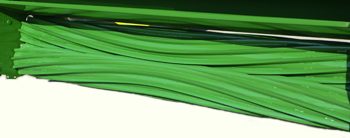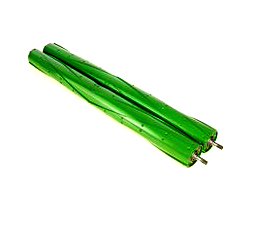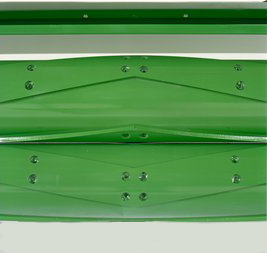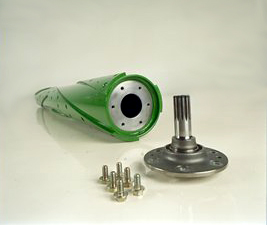 Close-up of V-10 steel conditioning rolls
Close-up of V-10 steel conditioning rolls
The V-10 steel conditioner rolls feature 10 angled flutes arranged in a chevron, or V-pattern along the length of the steel core.
Steel rolls offer improved wear life over urethane rolls, particularly in adverse crop conditions.
Advantages of the V-10 conditioner roll over the previous straight flute design are as follows:
Tri-Lobe™ steel conditioning rolls
 Tri-Lobe steel conditioning rolls
Tri-Lobe steel conditioning rolls
 Close-up of Tri-Lobe steel conditioning rolls
Close-up of Tri-Lobe steel conditioning rolls
Tri-Lobe steel conditioning rolls have three intermeshing chevron lobes to crush the length of the stem for improved conditioning and faster drydown. The rolls are manufactured using a patented process.
The steel material increases wear life, especially in abrasive crops or soil conditions. Durability is a distinct advantage compared to other crusher-style rolls made of rubber or urethane. The chevron design of the rolls gives positive feeding and improved crop flow.
These rolls are well suited for use in alfalfa, where reduced curing time results in less bleaching of the crop. In heavy, thick-stemmed crops, such as sudan or sudex, the steel construction of the rolls does a very good job of breaking up the nodes on the stems to improve drydown.
 Replaceable end shafts
Replaceable end shafts
The shafts on the Tri-Lobe rolls are steel forgings that are then machined. These precision parts have minimal run-out, which means the rolls themselves rotate precisely around their axis. This precision enables the rolls to be adjusted to a minimum clearance for consistent conditioning along the length of the rolls.
The machined, forged roll ends are bolted into the core of the Tri-Lobe steel roll. In the event a roll end is damaged, the entire roll does not need to be replaced. Each shaft can be replaced individually, resulting in lower repair costs.
For serviceability, each roll end has two threaded holes, so that bolts can be used to pull the shafts from the steel core of the roll.